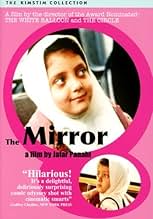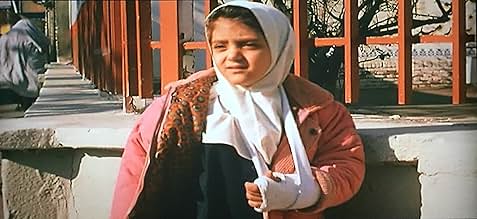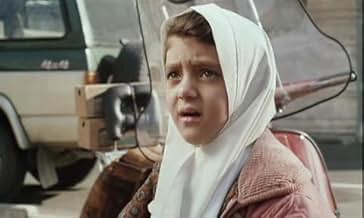IMDb RATING
7.5/10
3.5K
YOUR RATING
When a young girl becomes lost in the hustle and bustle of Tehran, her journey turns into a dazzling exercise on the nature of film itself.When a young girl becomes lost in the hustle and bustle of Tehran, her journey turns into a dazzling exercise on the nature of film itself.When a young girl becomes lost in the hustle and bustle of Tehran, her journey turns into a dazzling exercise on the nature of film itself.
- Awards
- 4 wins & 1 nomination total
- Director
- Writer
- All cast & crew
- Production, box office & more at IMDbPro
7.53.4K
1
2
3
4
5
6
7
8
9
10
Featured reviews
smart
Although this is no Hollywood, but just like another day in LA the poor director is having trouble with his temperamental star, save by quick thinking he somehow has turn this film into (perhaps) a far more interesting movie then he has intended.
Little Mina is a good actress, if not a very professional one, but one should consider that she is only in second year of her primary school and she has plenty of character to make up for it.
The film follows the day of Mina, and how she was trying to find her way home which mirrors the story of the film she no longer wants to take part in. The film lets us see the world from a little girl's point of view, hear her thoughts... it's a little reminder of how it was when we were little... being a child is not easy... no one wants to take you seriously, it takea you twice the time just to dial at a payphone, you don't remember those funny names grown up call those road.
It is a very interesting film, perhaps slow at first, but it will certainly make you laughs, make you think.
Little Mina is a good actress, if not a very professional one, but one should consider that she is only in second year of her primary school and she has plenty of character to make up for it.
The film follows the day of Mina, and how she was trying to find her way home which mirrors the story of the film she no longer wants to take part in. The film lets us see the world from a little girl's point of view, hear her thoughts... it's a little reminder of how it was when we were little... being a child is not easy... no one wants to take you seriously, it takea you twice the time just to dial at a payphone, you don't remember those funny names grown up call those road.
It is a very interesting film, perhaps slow at first, but it will certainly make you laughs, make you think.
Jafar Panahi must be recognized
Iranian director Jafar Panahi recently got arrested, charged with propaganda. He is sentenced to six years in jail and is banned from making movies for twenty years. This makes his 1997 movie "The Mirror" ("Ayneh" in Farsi) all the more interesting. The movie depicts a girl wandering Tehran's chaotic streets looking for her mother. Suddenly, she decides that she doesn't want to play the part anymore! First time that I've ever seen that happen in a movie.
The only other Panahi movie that I've seen is "Offside", about women getting kept from attending a soccer game, officially because the men's legs are showing. Judging by that, and by the conversations that the girl hears on the bus in "The Mirror", Panahi is not a director whose films really please Iran's authorities. There should be no doubt as to why he now languishes in jail. And above all, I truly recommend this movie.
The only other Panahi movie that I've seen is "Offside", about women getting kept from attending a soccer game, officially because the men's legs are showing. Judging by that, and by the conversations that the girl hears on the bus in "The Mirror", Panahi is not a director whose films really please Iran's authorities. There should be no doubt as to why he now languishes in jail. And above all, I truly recommend this movie.
10Red-125
Wonderful and powerful film.
Ayneh (The Mirror) is an unusual, interesting, and compelling work. The young star, Mina, is type-cast as a forceful and self-reliant young girl. The city of Teheran, as portrayed, has an almost anarchic quality to its vehicle and pedestrian traffic rules. The constant threat of accident adds a real edge to this cinema verité film. (In fact, the only problem I had with this movie was the ethical concern of allowing any actor, especially a young girl, anywhere near all this traffic.)
The Mirror is an excellent choice if you are looking for a noisy, exciting portrayal of an individual caught up in a realistic urban setting. Not a soothing film, but in my opinion, a great one.
The Mirror is an excellent choice if you are looking for a noisy, exciting portrayal of an individual caught up in a realistic urban setting. Not a soothing film, but in my opinion, a great one.
"How she rebels and who she rebels against is what turns this film into a masterpiece."
A child (Mina Mohammad Khani) waits in vain for her mother to pick her up after school. Whether she tries to resolve the dilemma herself or asks for help from the adult world, this serious little girl confronts dead-ends. At first She asks help from a motorcycle driver and the guy gives her a lift to the bus-stop then she takes the wrong bus so on and on.She challenges the adult world. "If you can show me the way I can go by myself" is a repeated line in the movie but the adult world does regard her either weak or it doesn't care about her.The close camera shot right on the little girl is very good really and the performance of this little girl deserves a standing ovation. Great job! The only thing is that I felt that the movie lacks a little bit action through the turmoil of urban life. The director focuses on littler girl more than necessary I guess. We hear some external voices (like the people on the bus) but the camera is always on the girl so this feels a little bit passive. Other than that it's really great!
The Mirror
This gimmick was so good that it has never been done again since. It's like going on after a fumble, you pick it up and end the play but it will not be the best, it will not be beautiful but this fumble will get you to score a point. It's an interesting exercise, one that will spark debates because you either go with it or no. I get either side of the fence.
It's not cinema, but it is a meta-commentary on fact and fiction. Don't we always say that "life beats film" - then why is this not the best film ever? You still have to separate the two - or you make a documentary. This feels like due to financial constraints you continue with a mistake, and double down...
It's not cinema, but it is a meta-commentary on fact and fiction. Don't we always say that "life beats film" - then why is this not the best film ever? You still have to separate the two - or you make a documentary. This feels like due to financial constraints you continue with a mistake, and double down...
Did you know
- TriviaIn a 2006 interview, Panahi said that the film was meant to show how "reality and the imagination are intertwined, they are very similar". Also he mentioned about how the film is staged in a way which normally nobody would suspect was drama but would instead believe was real.
- ConnectionsFeatured in This Is Not a Film (2011)
- How long is The Mirror?Powered by Alexa
Details
Box office
- Gross US & Canada
- $69,915
- Gross worldwide
- $69,915
Contribute to this page
Suggest an edit or add missing content


















